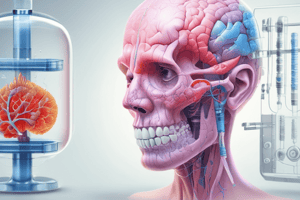Podcast
Questions and Answers
What is one primary advantage of Point-of-Care Testing (POCT) in emergency care settings?
What is one primary advantage of Point-of-Care Testing (POCT) in emergency care settings?
- It eliminates the need for patient consent.
- It provides diagnostic tests with lab-based equipment.
- It requires less training for staff.
- It allows for immediate results that aid in urgent assessments. (correct)
How does POCT facilitate monitoring chronic conditions?
How does POCT facilitate monitoring chronic conditions?
- By conducting infrequent tests.
- By providing long-term treatments.
- By using complicated laboratory equipment.
- By enabling real-time monitoring of parameters like glucose levels. (correct)
Which of the following diseases can be rapidly tested using POCT?
Which of the following diseases can be rapidly tested using POCT?
- Hypertension
- HIV (correct)
- Cholesterol
- Diabetes
What role does POCT play in remote and rural healthcare?
What role does POCT play in remote and rural healthcare?
Why is patient engagement enhanced by POCT?
Why is patient engagement enhanced by POCT?
What does POCT help to optimize in laboratory workflows?
What does POCT help to optimize in laboratory workflows?
What is a critical regulatory consideration for POCT devices?
What is a critical regulatory consideration for POCT devices?
Which aspect of public health can be enhanced by POCT?
Which aspect of public health can be enhanced by POCT?
In clinical trials, how does POCT contribute to research?
In clinical trials, how does POCT contribute to research?
What is a notable limitation of traditional laboratory testing compared to POCT?
What is a notable limitation of traditional laboratory testing compared to POCT?
Flashcards are hidden until you start studying
Study Notes
Applications in Healthcare
-
Definition of POCT: Point-of-Care Testing (POCT) refers to medical diagnostic testing performed at or near the site of patient care.
-
Rapid Diagnosis:
- Enables immediate results for conditions such as diabetes, strep throat, and influenza.
- Facilitates quick clinical decision-making.
-
Monitoring Chronic Conditions:
- Used for real-time glucose monitoring in diabetic patients.
- Cardiac biomarkers can be assessed to monitor heart conditions.
-
Infectious Disease Testing:
- Rapid tests for HIV, malaria, and COVID-19 for timely treatment and containment.
- Reduces the time to diagnosis compared to traditional lab tests.
-
Emergency Care:
- Essential in urgent care settings for assessing trauma and acute conditions.
- Tests like blood gas analysis and coagulation profiles can be performed on-site.
-
Remote and Rural Healthcare:
- Extends healthcare access in low-resource settings where laboratory facilities are limited.
- Mobile health units can utilize POCT to provide essential services.
-
Patient Engagement and Convenience:
- Increases patient satisfaction by reducing wait times for results.
- Encourages patient involvement in their own health management.
-
Laboratory Workflow Optimization:
- Reduces the burden on central laboratories by performing tests on-site.
- Frees up resources for more complex laboratory analyses.
-
Public Health Surveillance:
- Facilitates rapid outbreak response and monitoring of disease prevalence.
- Can be used in screening campaigns for large populations.
-
Clinical Trials and Research:
- Assists in monitoring patient parameters in real-time during studies.
- Improves data collection efficiency and patient compliance.
-
Regulatory Considerations:
- POCT devices must meet specific regulatory standards to ensure accuracy and reliability.
- Continuous quality control is critical for effective POCT implementation.
Point-of-Care Testing (POCT) in Healthcare
- POCT refers to medical diagnostic testing conducted at or near the patient care site, streamlining the diagnostic process.
- Provides immediate results for various conditions, facilitating rapid clinical decisions, thus enhancing patient care efficiency.
Applications of POCT
-
Monitoring Chronic Conditions:
- Enables real-time glucose monitoring for diabetic patients, allowing for timely management of their condition.
- Facilitates the assessment of cardiac biomarkers to monitor heart health actively.
-
Infectious Disease Testing:
- Available tests for HIV, malaria, and COVID-19 offer timely treatment opportunities, crucial for effective disease management.
- Significantly reduces the time needed for diagnosis compared to traditional laboratory methods.
-
Emergency Care:
- Vital in urgent care scenarios for quick assessment of trauma and acute medical conditions.
- On-site tests such as blood gas analysis and coagulation profiles greatly enhance immediate patient care.
-
Remote and Rural Healthcare:
- Expands healthcare access in areas lacking laboratory resources, improving overall health outcomes.
- Mobile health units leverage POCT to deliver necessary medical services in underserved populations.
Benefits to Patients and Healthcare Systems
-
Patient Engagement and Convenience:
- Enhances patient satisfaction through quicker result delivery, minimizing wait times.
- Empowers patients to take a more active role in managing their health.
-
Laboratory Workflow Optimization:
- Reduces pressure on central laboratories by conducting tests at the point-of-care, optimizing resource allocation.
- Allows laboratories to focus on more complex analyses, improving overall operational efficiency.
Public Health and Research Implications
-
Public Health Surveillance:
- Rapid responses to outbreaks are facilitated by POCT, crucial for monitoring disease prevalence.
- Can effectively be utilized in mass screening campaigns to assess public health challenges.
-
Clinical Trials and Research:
- Assists in real-time monitoring of patient parameters during studies, enhancing data accuracy and completeness.
- Improves patient compliance and efficiency in data collection, vital for research integrity.
Regulatory Considerations
- Regulatory standards are essential for POCT devices to ensure their accuracy and reliability in clinical settings.
- Continuous quality control measures are imperative for successful implementation and effectiveness of POCT services.
Studying That Suits You
Use AI to generate personalized quizzes and flashcards to suit your learning preferences.




